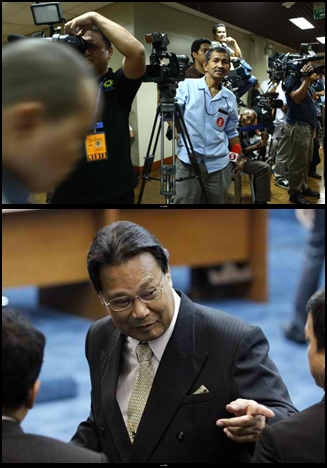by Isabelle dela Cruz
In the 2002 magazine issue of Philippine Journalism Review, an article entitled Watching the watchdog, Local press councils hope to make a difference, Ma. Roselle B. Miranda affirmed that media's one of the many functions is that of government watchdog. She had this comely question: What happens when the public has a complaint against the media? The press council is a self-regulatory body which began in Sweden in the 1940s is one answer. It was replicated in other countries. In the Philippines, the restoration of liberal democracy in 1986 was mixed up with the traditional idea of press council. Philippine Press Institute organized the Philippine Press Council for the purpose of accepting complaints of media's abuse to the public.The most serious problem that the press council in Metro Manila had faced was obviously the lack of eagerness or willingness of the person whose legal rights were violated to file a complaint. Another was the insufficient information of the public regarding on the existence and role of the council.
Publications like Philippine Journalism Review and the in-house ombudsman system are the other forms of self-regulation and function as the watchers of the watchdog. It reminds the media of its ethical and professional lapses such as inaccuracy, bias and sensationalism. Another problem of Manila-based press council was the capacity to receive and respond to the complaints from the communities outside Manila. Even if the complaints were already filed there was no assurance that the council could address them because it was doubtful that the council could have either the enough manpower or time to do that.
The establishment of regional press councils in year 2002 in Cebu, Baguio, and Palawan - where Center for Media Freedom and Responsibility (CMFR) began working with local partners in the press and non-government organization communities to plan, build and launch local press councils to hopefully solve the problems that seems to be incapable of having a solution.
CMFR organized a program to start the process of establishing the Philippine model for local press councils. "Corruption in Media: A Multi - Sectoral Perspective" was held on October 1999, where 28 leaders of the Philippine Press Community nationwide attended and decided that a new framework would help greater ethical compliance and professionalism of the free press in the country. From this meeting, plans to organize local press councils with more number of representation from non-media sectors began. Non-media representatives were included in the councils to disprove the public's perception that a press council is an "old boys club" formed by journalists to protect their own.
Publications like Philippine Journalism Review and the in-house ombudsman system are the other forms of self-regulation and function as the watchers of the watchdog. It reminds the media of its ethical and professional lapses such as inaccuracy, bias and sensationalism. Another problem of Manila-based press council was the capacity to receive and respond to the complaints from the communities outside Manila. Even if the complaints were already filed there was no assurance that the council could address them because it was doubtful that the council could have either the enough manpower or time to do that.
The establishment of regional press councils in year 2002 in Cebu, Baguio, and Palawan - where Center for Media Freedom and Responsibility (CMFR) began working with local partners in the press and non-government organization communities to plan, build and launch local press councils to hopefully solve the problems that seems to be incapable of having a solution.
CMFR organized a program to start the process of establishing the Philippine model for local press councils. "Corruption in Media: A Multi - Sectoral Perspective" was held on October 1999, where 28 leaders of the Philippine Press Community nationwide attended and decided that a new framework would help greater ethical compliance and professionalism of the free press in the country. From this meeting, plans to organize local press councils with more number of representation from non-media sectors began. Non-media representatives were included in the councils to disprove the public's perception that a press council is an "old boys club" formed by journalists to protect their own.

 RSS Feed
RSS Feed